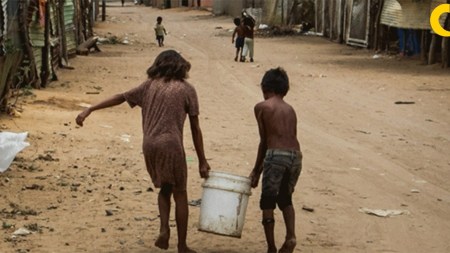COLOMBIAN PLATFORM FOR HUMAN RIGHTS DEMOCRACY AND DEVELOPMENT
Hunger alert in Colombia
Statement on the food insecurity situation in Colombia
February 3, 2022.
The Colombian Platform for Human Rights, Democracy and Development (PCDHDD) expresses its concern regarding the food insecurity situation in Colombia and its possible worsening in the coming months.
On January 27, 2022, the World Food Program (WFP) and the Food and Agriculture Organization of the United Nations (FAO) published the report entitled “Hunger hotspots”, which shows some early warnings and recommendations on particular social, climatic and economic variables that could exacerbate food insecurity in Colombia, Honduras, Ethiopia, Nigeria and Yemen, among 20 other countries worldwide.
In the case of Colombia, the report notes that political instability, the impact of the COVID-19 pandemic, unemployment, the regional migratory crisis, and internal displacement are factors aggravating the hunger situation in the country, so that 7.3 million Colombians will need food assistance this year.
The National Government quickly expressed its rejection of this report and urged the FAO to remove Colombia from the map of countries at risk. In response, the FAO representative in Colombia recognizes that there were some errors in terms of communication for not previously socializing the document with the government to receive its comments, and because the map used in the report does not accurately illustrate the situation of Colombia by not differentiating it from countries with acute food insecurity conditions.
However, this does not mean that Colombia does not have a worrying situation concerning hunger and that the government must act swiftly. Factors such as unemployment, increasing poverty, child malnutrition, corruption in food plans, and the particular situation of some regions, are alarming for the fulfillment and guarantee of Economic, Social and Cultural Rights (ESCR), especially the right to food.
According to figures reported by the National Administrative Department of Statistics (DANE) in 2021, national monetary poverty increased 6.8 points and reached a 42.5 %, which means that 21 million people are below the poverty line. Likewise, extreme poverty increased 5.5 points and reached a 15.1 %. and unemployment for 2021 had a rate of a 13.7 % (2.2 percentage points less than that recorded in 2020, but a 3.2 % more than in 2019).
On the other hand, according to the National Administrative Department of Statistics’ Social Pulse survey, by 2021, 1.6 million families reduced their food to only two meals a day; 179,174 live on one meal and 23,701 sometimes do not even get one plate of food a day.
In addition, child malnutrition continues to be a latent phenomenon. For 2021, the Ombudsman’s Office presented a report stating that, up to August, 8,545 cases of children under 5 years of age with acute malnutrition were reported, 38% more than in 2020. La Guajira continued to be the most affected region with 22.6% of the cases[1], even though for this department an Unconstitutional State of Things was declared in 2017 due to the massive violation of human rights against the children of the Wayúu people in terms of food, health and water.
Likewise, and in spite of the malnutrition situation, corruption problems with the School Feeding Program – called PAE – the oldest food assistance system in Colombia – do not cease. According to the Office of the Comptroller General of the Republic, 153 fiscal responsibility processes are currently underway for more than $47 billion, due to irregularities in contracting, coverage, quality and logistics[2]. In addition, so far in 2022, 23 alerts have already been filed regarding the quality and safety in the delivery of PAE food in Cartagena, Barranquilla and Bucaramanga[3].
Finally, it should be noted that agriculture in Colombia has great potential and even, in 2016, the FAO stated that Colombia is one of the five most important countries to be a global food pantry due to its location and availability of land. However, paradoxically, more than 65% of the potential land for agriculture in the country is not used, the national production of family farmers from indigenous, peasant and ethnic communities is not supported by public policies with budgets and concrete institutional responsibilities that support the production and distribution of food destined for regional and national supply systems with fair marketing mechanisms. In addition, access to land for peasants continues to be a difficulty.
From the PCDHDD we urgently call on the national government to recognize the current situation regarding the different factors that could aggravate food insecurity in the country and to take prompt measures to mitigate them and guarantee the right to food of all inhabitants.
We invite citizens to continue supporting and demanding the implementation of measures such as basic income as a mechanism to guarantee the enjoyment of economic and social human rights and the construction of democracy, the full implementation of the Peace Agreement and support for national food production.
Contact:
Aura Rodríguez
Technical Secretary PCDHDD
Cell phone: +57 316 7405749

